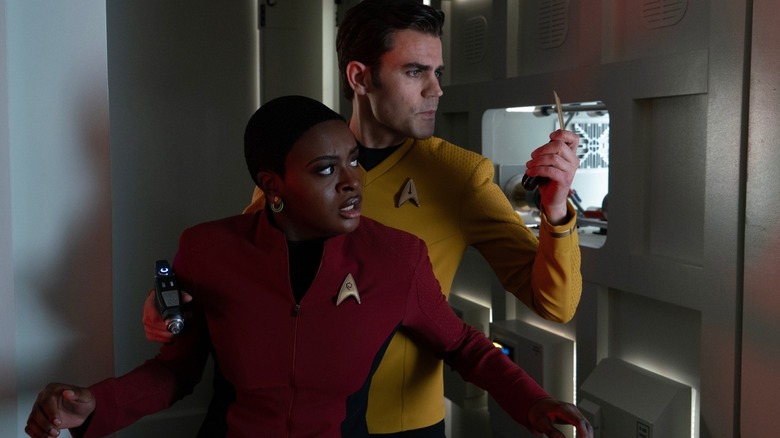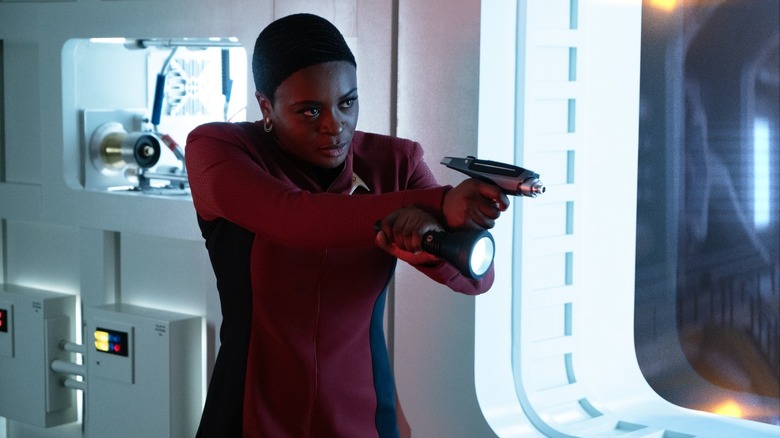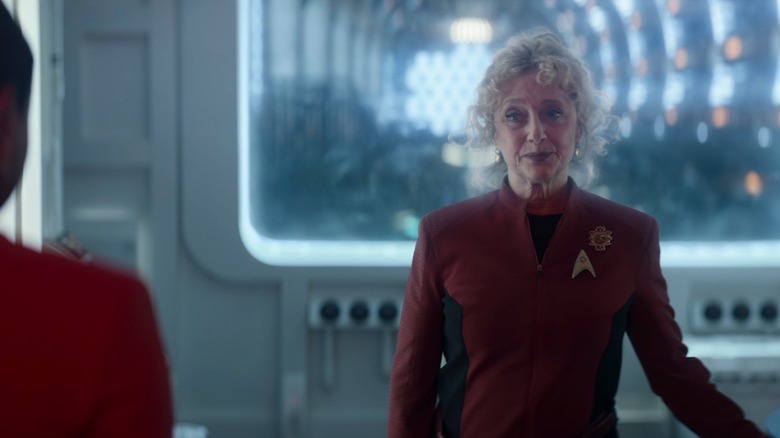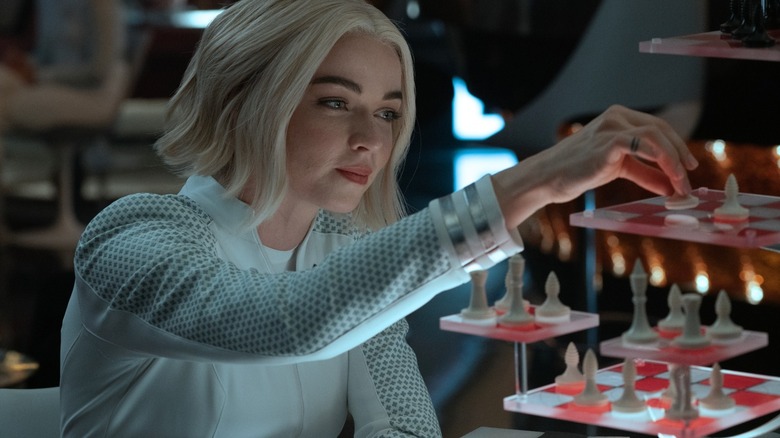Star Trek: Strange New Worlds Season 2 Episode 6 Brings Friendship And Zombies
Despite having seen sixteen episodes of "Star Trek: Strange New Worlds" over the course of the last 14 months, it still feels mildly astonishing that it has so stringently adhered to its classically episodic structure. A few of the recent-vintage Trek shows (in)famously abandoned episodic storytelling, preferring to smear "epic" stories across a whole season. In so doing, however, the new shows had to abandon crucial storytelling elements that proved to be vital to the spirit of "Star Trek." Most notably, the new structure rarely allowed for episodes that focused almost exclusively on individual characters, allowing audiences to see their personal lives, their hobbies, their professional integrity, their intimate phobias. It's hard to get to know someone if they're in an ensemble that is constantly in crisis mode.
In the latest episode of "Strange New Worlds," called "Lost in Translation," the series highlights Ensign Uhura (Celia Rose Gooding) for the first time. As the communications officer on the U.S.S. Enterprise, she is fluent in multiple languages, monitors subspace frequencies, and spends a lot of time studying. She also, we now learn, is still emotionally smarting from a shuttlepod crash from her childhood, and from the recent death of Hemmer (Bruce Horak) the Aenar engineer who died in the last season of "Strange New Worlds." "Lost in Translation" fills out Uhura as a character, telling a story that pivots on her unique translation skills, but also how much she values her friendship with her fellow crewmates. Gooding gives an amazing performance in an episode that gives her a lot to do.
As with a lot of Trek, the story may be a little familiar (it has shades of "Home Soil" or "Devil in the Dark"), but as a character episode, it's quite good.
Also, she battles zombies.
Hallucinations
"Strange New Worlds" fans will be happy to see the return of Hemmer in "Translation," even if it is just on the screens of pre-recorded video logs. It seems that Uhura was, in her spare time, trying to learn more about the technical aspects of the Enterprise, and the chief engineer agreed to show her around. Uhura then hears a curious noise in her head and a rotten, zombie version of Hemmer (also Horak) briefly appears in front of her in a turbolift. She is terrified. Because this is "Star Trek," and characters behave sensibly, she immediately goes to sickbay. It's a mystery.
Uhura's hallucinations continue and become more intense. They also seem to be common; another crewmate appears to be going mad and is driven to blow up the ship. This is an issue for Captain Pike (Anson Mount) who has been charged with overseeing a massive interstellar mining operation. The mining equipment stops working and, in a fun B-plot, Commander Una Chin-Riley (Rebecca Romijn) and Pelias (Carol Kane) bond over their mutual resentment of one another. Pelia is sloppy and Una is fastidious. It doesn't take a lot of screentime, but their Oscar/Felix relationship — and eventual mutual understanding — is very sweet.
Indeed, it seems that friendship is at the heart of the episode. Visiting the Enterprise for the first time is James T. Kirk (Paul Wesley), the brother of "Strange New Worlds" regular Sam Kirk (Dan Jeannotte). "Strange" has featured Kirk in a few past episodes, but they were all, to date, from alternate timelines. This is the first full-bodied appearance of the in-canon Kirk as he will come to be seen on the 1966 TV series.
James and Uhura will become fast friends.
Friendship is magic
On "Strange New Worlds," Kirk is a lot warmer and affable than he was even on the original 1960s TV series. He is compassionate and cares when he sees that Uhura is in distress. He offers her cookies and conversation. Since he is not a captain yet — he only just now became the First Officer onboard the U.S.S. Farragut — Kirk is freer to be more personable. His warmth and offers of friendship allow Uhura to open up and the two bond deeply. Their friendship is so warm, in fact, it makes some of Kirk's discipline of Uhura on the 1966 series seem a little harsh.
But then, "harsh" is not the "Strange New Worlds" metier. This is a comforting, friendly, semi-comedic show about enthused, upbeat people. The angst of "Discovery" and "Picard" is nonexistent here, and people are depicted as surviving through the power of their relationships and their impressive professional skills.
Because Uhura is a language expert, the solution to "Lost in Translation" will involve translating a very, very oblique form of communication into plain English. The Enterprise will learn that Uhura's hallucinations are actually being psychically communicated to her by an ineffable, unseen, interdimensional alien force. Uhura, then, has to "translate" the hallucinations, which seems to have more to do with Freudian interpretation than plain syntax.
Sadly, the "Translation" doesn't give quite enough time to the aliens. Once Uhura figures out what's going on (both James and Sam Kirk help her), she barks orders up to Captain Pike and the crew takes swift action to blow up a space structure and save the day. There are no moments of cultural exchange or conversation. A First Contact moment would have been nice.
How canon is it?
That Uhura was communicating with noncorporeal aliens, however, makes "Lost in Translation" the second episode in a row to feature such creatures.
"Lost in Translation" also sees a development in the sexual/romantic relationship between Spock (Ethan Peck) and Nurse Chapel (Jess Bush). At the end of "Charades," the two shared a kiss and it was implied that they also had sex. Now they are playing chess in the mess hall, and Spock is pondering whether or not to report their dalliance to the captain; inter-officer fraternizing and all. In true scientific fashion, Spock declares that he will, for a period, be "experimenting with emotions," meaning he'll smile more in the future and perhaps tell Chapel that he loves her. This behavior will come into play more in the following episode.
A lot has been dumped on the Peck version of Spock already. He was saddled with a previously-unknown sister in "Discovery," was said to have been on the lam after being accused of murder, and escaped from a mental institution. He was transformed into a human briefly and requires therapy to keep his emotions in check. The makers of "Strange New Worlds" are burying a LOT under Leonard Nimoy's skin. In "Translation," Spock is now warmer, more loving, and more emotional than ever. It's such a dramatic change in his character, a Trekkie might wonder if this Spock will link canonically to the one we've known for 57 years.
At the very least, something dramatic and heartbreaking will have to occur before the 1966 "Star Trek" can begin. Trekkies will have to steel themselves.
The 3-D chess set in the photo above is, incidentally, the same one that Trekkies can purchase from the "Star Trek" website.



